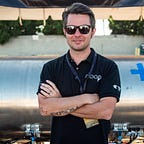How Pop Culture Influences Technology
I was lucky to be invited to the opening of an exhibit called POPnology last week at the Ontario Science Center. POPnology demonstrates how pop culture has inspired technological innovation, and draws connections between interpretations of technologies from the past and their modern counterparts. I was transported back to my youth, when I would spend carefree days watching TV shows like The Jetsons and Star Trek, movies like The Rocketeer and Back To The Future, and pouring over Amazing Stories and Popular Mechanics magazines.
I was invited to the exhibit opening thanks to a convocation speech I gave to the graduating students from the schools of Science, Engineering, Technology, Skilled Trades, Apprenticeships and Renewable Technology at my alma mater last year, in which I commented on my early love for Science Fiction and how that helped to launch my lifelong interest in technology and innovation. I wasn’t exaggerating — the exposure to those imagined worlds and the technological possibilities of the future had a profound and lasting impact on me. The promises of the fantastical technology we would enjoy in the 2000’s made me incredibly excited to see what our future might look like, and eager to be able to play a role in realizing it.
In his opening remarks, Edward Eyth — a conceptual designer who worked on many of my childhood favorites — brought attention to many Science Fiction ideas that became Science Fact.
In Stanley Kubrick’s 2001: A Space Odyssey, Dr. David Bowman watches news and receives messages on a large, handheld screen, which very much resembles the tablets we use today. The film was released in 1968.
Dr. Martin Cooper, who invented the handheld mobile phone, credits watching Captain Kirk using his communicator in Star Trek as inspiration for the concept. Even Jeff Bezos has said that the vision for the Amazon Echo is to become the computer from Star Trek. The list goes on.
While the actual technology imagined in such groundbreaking science fiction certainly has inspired those we enjoy today, I believe it plays a more critical role in inspiring young minds to get excited about innovation and to get involved in STEM fields. It’s important that we encourage people to understand the technology around them and empower them to be able to actively participate in technological development. I believe we can live in greater wealth, comfort, and prosperity, and that we can realize exponential societal, economical, political, and cultural advancements through technological innovation. And I have Science Fiction to thank for that.
